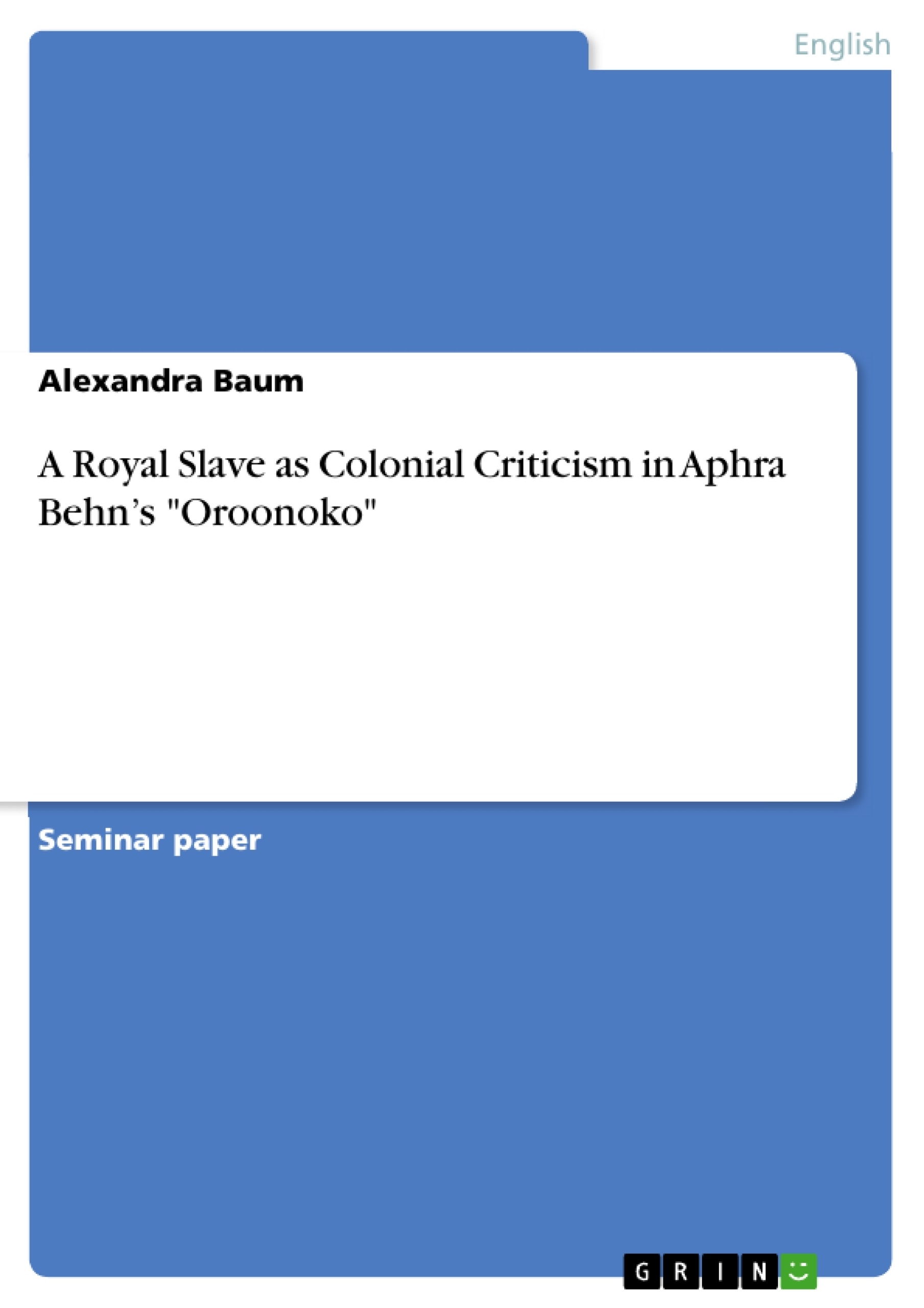Aphra Behn’s narrative "Oroonoko or the Royal Slave" was published one year before her death in 1688 at a time when the Atlantic Slave Trade and African Slavery were in full blossom as a result of European Colonialism. The story is about the curious case of the gallant prince Oroonoko who got pulled into slavery and was deported to the British colony of Surinam in the 1660’s. Behn’s work combines different genres of texts such as the travel narrative, the romance but most importantly social criticism.
Although Oroonoko is regarded as a literary work by many scholars that has advanced and supported the cause for the abolition of slavery in Britain as well as in it’s colonies, it is in fact a non anti-slavery text. The author does not touch the pressing issue of slavery as such because she presents us with a rare and exceptional kind of slave. Nevertheless, the book clearly illustrates through the depiction of its hero the injustice, cruelty and arbitrariness of slavery that has been brought upon the African peoples by European Colonialism.
In this paper I will show Behn’s unusual presentation of a royal slave in order to criticize British Colonialism, first, by giving a brief overview on Transatlantic African slavery that is portrayed in early modern literature, second, by analyzing the depiction of slaves in Behn’s narrative with a special focus on Oroonoko the royal slave, and finally by illustrating Behn’s necessity for choosing a tragic hero, who could have never been protected from the depths of slavery by his royal status.
Table of Contents
- Introduction
- Overview on the Transatlantic African slavery and its portray in early modern literature
- Slavery in Oroonoko
- Representation of slavery
- Depiction of the royal slave
- Aphra Behn's Oroonoko: The tragic hero
- Conclusion
Objectives and Key Themes
This paper aims to analyze Aphra Behn's Oroonoko, or the Royal Slave, specifically focusing on the author's unusual presentation of a royal slave as a means of criticizing British colonialism. The paper will examine the transatlantic African slave trade within early modern literature, analyze the depiction of slavery in Oroonoko with a particular focus on the royal slave, and ultimately explore the author's deliberate choice of a tragic hero whose royal status could not shield him from the horrors of slavery.
- Transatlantic African slavery in early modern literature
- Representation of slavery in Oroonoko
- The depiction of Oroonoko as a royal slave
- Behn's choice of a tragic hero
- The use of Oroonoko as a critique of British colonialism
Chapter Summaries
The introduction provides context for Aphra Behn's Oroonoko, highlighting its publication in 1688, a time when the Atlantic slave trade was flourishing. The narrative centers on Oroonoko, a gallant prince who was enslaved and transported to Surinam. The introduction also emphasizes the work's blend of genres, including travel narrative, romance, and social critique.
The second chapter delves into the portrayal of transatlantic African slavery in early modern literature. It discusses the role of the British in the triangular trade, highlighting their involvement in the cultivation of sugar cane in their West Indian colonies. The chapter also explores the writings of former slaves, such as Olaudah Equiano, Frederick Douglass, and Harriet A. Jacobs, who utilized their autobiographies and narratives to shed light on the injustices and brutalities of slavery.
The third chapter focuses specifically on the depiction of slavery in Behn's Oroonoko, analyzing the author's unique representation of the royal slave. This chapter examines the contrast between Oroonoko's royal lineage and his enslaved status, ultimately exploring how Behn uses this juxtaposition to expose the absurdity and cruelty of the slave trade.
Keywords
This paper focuses on transatlantic African slavery, early modern literature, Aphra Behn, Oroonoko, royal slave, colonialism, social criticism, tragic hero, triangular trade, and the depiction of slavery in literature.
- Quote paper
- Alexandra Baum (Author), 2014, A Royal Slave as Colonial Criticism in Aphra Behn’s "Oroonoko", Munich, GRIN Verlag, https://www.grin.com/document/286153




